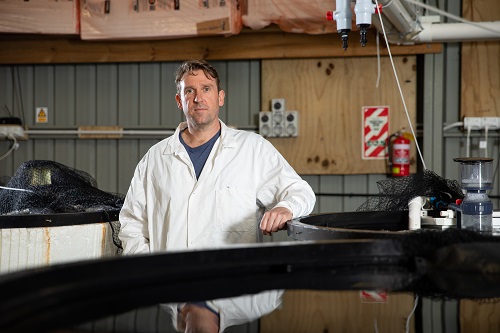Source: University of Waikato
Aquaculture has become a hot-button topic this year, with the release of the Netflix documentary Seaspiracy.
However, the way the industry is portrayed, and some facts in the story, are not the whole truth, contends Dr Simon Muncaster, senior lecturer in the School of Marine Science and Aquaculture at the University of Waikato in Tauranga.
He is speaking at a free public lecture on Tuesday July 6, from 6pm, at the University’s Durham Street campus in Tauranga’s CBD.
The event, Aquaculture in the 21st century; a problem or solution?, will look at some of the issues facing the aquaculture industry, bust some myths, and offer some solutions for the future.
The New Zealand government has a goal of growing our aquaculture industry to $3 billion in sales by 2035.
Dr Muncaster contends that it is possible to do this sustainably and in collaboration with communities, although there are challenges for the industry.
“Aquaculture cops some negative press for its environmental impacts, but any farming has an associated environmental effect. The important issue is how you minimise and mitigate this.”
With the world’s growing population, Dr Muncaster says “we have to farm [and] we have to eat”.
“If you look at the planet, over 70 per cent is ocean and water. So to only farm terrestrially is missing one of our largest resources. Aquaculture can be an extremely efficient way of producing protein.”
“[But] if you are going to use a resource, you want to treat it as respectfully as you can.”
Looking for more sustainable solutions drove his PhD research at the Norwegian Institute of Marine Research, which focused on building a new candidate species for aquaculture.
“Ever since then I’ve been wanting to get into more environmentally sound aquaculture.”
Dr Muncaster returned from overseas in 2010 to work at Toi Ohomai Institute of Technology, and began working at the University of Waikato – Tauranga in 2019.
More recently, he has been working with a multidisciplinary research team and local iwi on the opportunity to farm New Zealand flounder, or pātiki.
“The New Zealand industry is essentially based on three species: green shell mussels, king salmon (or Chinook salmon) and the Pacific oyster.
“To build a robust and sustainable aquaculture industry, we need diversification, and that’s something I’m interested in.”
Flounder has the potential to be grown in shallow waterways, rather than needing big sea cages and tanks. It also offers an opportunity for coastal landowners and iwi to farm fish in shallow raceways as well as to investigate the possibility of restocking the environment. Both of these concepts would be a move away from typical commercial aquaculture models.
Dr Muncaster’s public lecture series was inspired by his reaction to the Netflix documentary, Seaspiracy.
“For me, it was seeing a whole lot of selective truths and wanting to address that.”
Those who want to know more, should attend the lecture – which is free and open to the general public – including anyone interested in studying aquaculture at university level.
“I won’t necessarily be an apologist for aquaculture. Here, we don’t shy away from the fact that historically, there have been environmental impacts from aquaculture. A good aquaculture student needs to be aware of that. We want to produce students who are driven to improve the industry and make it cleaner, stronger, better.”
He says the university’s aquaculture programme is leading the way, with “cutting edge research” which will offer solutions to the industry.
“This is a progressive region for developing aquaculture,” says Dr Muncaster. “And in terms of lifestyle, Tauranga has a lot to offer, with the ocean on our doorstep.”



